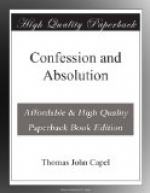But, it may be asked, how has such a change been wrought in the minds of Episcopalians on both sides of the Atlantic? The Oxford movement of some forty-five years ago turned men’s minds to the early history of the Church: and, finding confession and absolution then to be the ordinary and necessary conditions for reconciliation with God, the practice was introduced, but without seeing the important truth that, besides valid ordination, there is needed jurisdiction from the Church, so as to make absolution of avail.
This new school of religions opinion among Anglican and Protestant Episcopalians contributes its share of testimony to uphold what the Church of God has always taught, namely, that over and above having a genuine supernatural sorrow for sin, there is ordinarily required on the part of the sinner confession of sin, followed by the judicial absolution of God’s minister, approved and commissioned by the Church, who alone possesses the power of the keys to remit or retain sin, and who has therefore the sole right to approve and authorize confessors.
* * * * *
The constant practice of the Roman Church; the belief and practice of the earliest schismatics; the existence of the Penitential Canons; the statements of the Fathers, representatives of all Christian lands in the first five centuries, when Latins and Greeks were in the “Undivided Church”; the discovery made by High Churchmen in our day: render, separately and cumulatively, evidence to the belief in “Confession and Absolution” which no reasonable man can or ought to reject. It is plain that had so painful a task as the confessing of sin to man not been of Apostolic origin, assuredly its introduction to the Christian Church would have caused the bitterest struggle, and the date of such a movement would have been indelibly impressed on the page of history. But no such strife is recorded.




